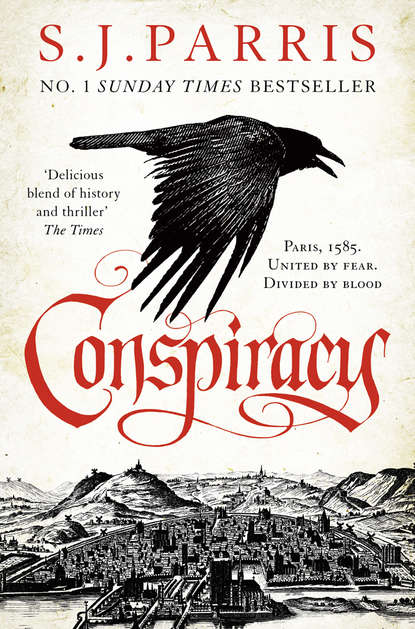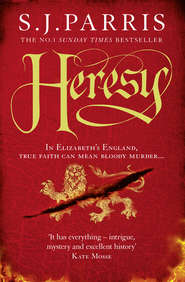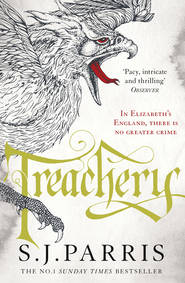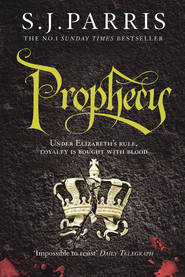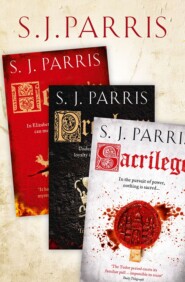По всем вопросам обращайтесь на: info@litportal.ru
(©) 2003-2024.
✖
Conspiracy
Автор
Год написания книги
2019
Настройки чтения
Размер шрифта
Высота строк
Поля
The young curate’s eyes narrowed. ‘I thought you said you did not attend service here?’
‘I came on Sunday. He invited me in person.’
He weighed this up and nodded. ‘You are right. It was quite the opposite, in fact – the more he seemed to be unravelling in private, the more of a demagogue he became in the pulpit. As if he could drown out his doubts by shouting his convictions in public.’
‘And you have no idea what prompted this – unravelling? Was there a confrontation, perhaps?’
A guilty flicker across his face; the eye tic quickened. I waited.
‘Four weeks ago,’ he said, so quietly the words barely escaped his lips, ‘the first day of November, we had celebrated the Mass of All Souls. I stayed late after the service to clear up and lock away the silverware. I thought everyone had left, but when I came back to the ambulatory, I heard raised voices from inside this chapel. Père Lefèvre was arguing with someone.’
‘Did you hear what they said?’
‘Père Lefèvre called him Judas. The other man laughed, and said Lefèvre should be more careful with his words. I wanted to get home but I didn’t want them to think I’d been listening, so I made an obvious noise outside and they fell silent immediately. They must have thought they were alone. The other fellow slipped away down one of the side aisles and Lefèvre walked out and tried to greet me as if nothing had happened. But I could tell he was upset.’
‘Did you see the man he was arguing with?’
‘I did not catch sight of his face, but I saw what he wore.’ He hesitated, biting his lip again. ‘The black habit of the Augustinians.’
‘A friar from Saint-Victor, then?’
He seemed about to reply when I thought I caught a slight movement outside the chapel; I whipped around, but when I poked my head out, there was no one in sight in either direction. The curate had heard it too; his eyes darted around the walls like a cornered animal.
‘You must leave now. I have to lock the church.’
He chivvied me out into the damp air. When I turned the corner by the apse, I saw that the crowd had grown; people stood on tombs and jostled for position along the wall as the man with the stubble, his voice now hoarse, whipped them on to cries of bloody vengeance against the King. The mood had darkened; they brandished makeshift weapons and turned black stares on those who did not join in with the chorus of slogans.
‘Death to the House of Valois,’ I muttered, to placate a murderous-looking blacksmith who was eyeing me while pounding a hammer into his fist. The mob had knotted tightly around the churchyard gate; it would be impossible to fight my way through without injury. I knew how these protests ended, too; shop windows smashed, carts and houses set on fire, people bloodied and wounded in the confusion; then royal troops called out to quell the crowd, shots fired, more injuries or even deaths, which would stoke the anger further. I only wanted to get away as quickly as possible. I decided I would have to climb over the wall, though it was hard to see a place where it was not jammed with eager spectators. I glanced to my left and noticed a tall man of about my own age standing on the fringe of the crowd, his arms folded, watching the growing frenzy with an air of detachment. His clothes were expensively tailored, his neat pointed beard and chestnut hair carefully barbered, making him conspicuous in this rabble of rough-clad tradesmen and apprentices. I wondered if he was an informer. He glanced across and caught my eye with a frankness that implied recognition. I half-expected him to address me, but his look seemed neither friendly nor hostile; he merely observed me, making no attempt to hide it, before returning his attention to the man still delivering his impassioned speech from the plinth. Unease needled up the back of my neck. A quick check through my memory assured me that I did not know his face, though he had seemed to know me. I turned and walked briskly the way I had come, away from the mob, conscious of the stranger’s eyes following me until I was out of sight.
It was a relief to escape the churchyard; the mood of the crowd promised violence before too long. I realised I had not eaten since the night before and my stomach was pinched with hunger. On the corner of rue Saint-Jacques I bought a galette in a greasy paper from a street vendor and demolished it in two bites. The noise from Saint-Séverin carried through the chilly air; the vendor shook his head and began to pack up his wares, anticipating a riot. Over my left shoulder, the façade of Notre Dame gazed downriver towards the Louvre, serene and implacable on its island.
The rabble and its leader clearly held the King responsible for Paul’s death, or were content to use it as an excuse, though I concluded that I had no choice but to proceed as if Henri were telling the truth: that he had nothing to do with the murder and that the Duke of Guise, having encouraged Paul to attack the King in his sermon, had then had him murdered with the sole purpose of inflaming further outrage against the House of Valois. If that were the case, it meant I was looking for evidence that would link the murderer to Guise, who already had more than enough reason to want me dead, if he too suspected that I had been instrumental in disrupting his plans to invade England. Guise had no firm proof that I had intercepted those letters in London, but that hardly mattered; since I was the only known enemy of the Catholic Church living in the French embassy at the time the conspiracy was uncovered, it hardly took advanced powers of reasoning to point the finger in my direction. As I had already observed, Guise was no fool. If the Duke found out I was trying to expose him a second time, he would have my balls roasted on a skewer, while the King looked the other way and studied his manicure. In that light, it became clearer why Henri had asked me to undertake this business and not one of his usual fixers: he considered me expendable.
I passed under the Porte de la Tournelle and paused in the shelter of the tower wall to wipe my forehead where the mist had condensed in cold droplets on my hair and brows. Behind me, under the shadow of the arch, I thought I glimpsed someone else stopping too. I twisted around, but saw only the usual stream of hawkers and goodwives, mules and handcarts, ragged children and dogs, all spattered with mud and weighed down with bales of cloth, coils of rope, barrows of vegetables or baskets of eggs, making their way in and out of the city to barter or beg. No one obviously loitering or watching me; and yet, after nine years of living in exile, one eye always open for anyone who might want to arrest me or knife me in a back alley, I had developed a finely tuned instinct for being followed, and now it quivered like a cat’s whiskers. I pulled up the hood of my cloak and moved on along the road away from the Porte, straining to catch any unexpected movement through the grey air.
The abbey church of Saint-Victor reared up in the distance behind its boundary wall and orchards, its spire a bony finger poking through a shroud of low-lying mist swirling up from the river. A lone crow called into the empty sky, as if announcing my arrival. I shivered, wondering if the night’s rain had washed Paul’s blood away from the track along the bank behind the abbey, by that small door in the back wall. Now there was a man in a friar’s habit to add to the picture, and I wished the curate’s testimony had not pointed me here again.
Saint-Victor – or at least its opulent library – had become a kind of sanctuary for me since my return to Paris. Four years ago, before I left for England, the old abbot had been pleased to grant me free access to the library, despite the misgivings of some of his brothers over my writings, but that was when I had the distinction of being a Reader at the Sorbonne and personal tutor of philosophy to the King, before the rumours of magic trailed after me. The new Abbé was deeply conservative in matters of religion and learning, a public supporter of Guise and the Catholic League; though Frère Guillaume Cotin, the librarian, had welcomed me back as a friend, we had kept the arrangement between ourselves. But I had come to depend on the library, and not merely because it would be impossible for me to finish my next book without access to its manuscripts. In all the turbulence of the last few months, I had come to find in its stillness and its smell of old books, polished wood and candles, a comforting sense of order. I did not want to lose my one refuge in Paris, nor did I wish to cause any trouble to Cotin, after his generosity to me. If Paul’s killer came from the abbey, he would have powerful men protecting him, and they would not welcome the intrusive questions of an ex-Dominican known to be a friend of the King.
An ominous silence hung over the scriptorium with its rows of chained manuscripts; at the hour of None, most of the friars would be in church. Two who must have had special permission to miss divine service were still working at desks under the west windows; they glanced up with mild curiosity as I entered. Cotin bustled across to intercept me. He had evidently been waiting.
‘Bruno! I thought you weren’t coming today. I feared—’ He glanced across the room at the two young copyists, who had turned to whisper to one another, and nodded me towards a spiral staircase in the corner. This led to an upper gallery, which in turn opened on to a series of connecting rooms, each with a locked door guarding the volumes considered either too valuable or too inflammatory for public display. Cotin unlocked the first of these doors from a key ring on his belt and pulled me inside, closing it behind him.
‘They’ve been looking for you,’ he said, breathless. He was well into his sixties by now; short and broad, with tufts of white bristle sprouting from his ears and nostrils and a bushy greying beard, as if all the hair had migrated south from his flaking scalp. Without his eyeglasses, his face appeared undefended, his pale blue eyes squinting and anxious, as if fearful of missing some vital detail. ‘There’s been a lot of talk, since yesterday, that business with the priest. What’s going on, Bruno?’
I shook my head. ‘Who’s looking for me?’
‘The Abbé wants to question you. They know the priest asked for you before he died, and spoke some words that you refused to share. The Abbé called me in to see him last night – gave me quite an interrogation. How long you had been coming here, which books you asked for, what you were writing. He was not happy that I had let you return without seeking his permission.’ He paused and grimaced, pulling the cloth of his habit away from his neck as if it was chafing.
‘I am sorry to have caused you trouble. I never anticipated—’
He tutted the apology away, glancing over his shoulder. ‘The Abbé is a pompous fool. I have learned to accommodate him. But there is a great commotion over this death, Bruno – apparently the priest was a close associate of the League, and the Duke of Guise regards his killing as a personal attack. The Abbé wants to know what secrets he whispered to you on his deathbed.’
‘I see. Prompted by his love of justice, of course.’
Cotin gave me a long look from under his brows. ‘The Abbé has his eye on a cardinal’s hat. He thinks Guise is his surest route to one. And he has no choice but to concern himself with this murder, since the priest died inside the abbey walls.’
‘He was attacked only yards from your back gate, too,’ I said. ‘I’d be surprised if that was a coincidence.’
His face contorted with distress. ‘God have mercy on us all. There is something I must show you, Bruno. You are the only man I dare tell.’ He stopped abruptly, laying his hand on my sleeve, head cocked as if listening. I thought I caught a sound from the room behind us. ‘Follow me. The servant on the gate will have told them you’re here by now. We’ll go out this way.’
He unlocked the far door and led me through a further succession of rooms until we emerged from a tower in the west side of the courtyard beyond the cloisters. Cotin motioned to me to keep back inside the doorway until two friars had passed, carrying a basket between them. When he judged we were safe, he led me along a passageway between stone walls and out into the gardens behind the abbey’s complex of buildings. Here we were exposed, though the dense mist offered a useful cover; Cotin pulled up his hood and I followed his example as we hurried across the open space to the shelter of the orchard beyond.
Fruit trees loomed in twisted shapes, the fog lingering clammy between them, but Cotin ploughed on, ducking under branches and around trunks with a dogged sense of direction, despite the absence of any path that I could make out. I glanced back to see if we had been followed, but saw nothing through the web of mist except the knotty outlines of bare trees.
After a good ten minutes’ walking we reached the far side of the orchard and the solid mass of the boundary wall appeared, twelve feet high around the perimeter. Gulls circled above, harsh calls echoing over the river on the other side. I had not been to this part of the abbey grounds before; there had been no reason for me to venture so far from the main cloister and the library. I now saw that a row of low buildings lined the inside of the perimeter wall. There was no sign of any living soul out here. As we approached the outbuilding at the end of the row, Cotin selected a key from the ring at his belt and as he fiddled with the lock, I noticed a narrow path running along the inside of the wall. I followed the line of it as far as I could see and realised that it led straight to a small wooden door, set into the wall. This must be the gate I had seen from the towpath on the other side, where I had found the evidence of Paul’s death. I wondered what Cotin could want to show me here with such urgency.
He ushered me through the low doorway, peering back into the mist to make certain we were still alone. Once inside, he took down a lamp from a high shelf behind the door, drew out a tinder-box from inside his habit and struck the flint, lighting the stub of candle, before pulling the door closed behind us. Rodent feet scuttled away into the corners at the sound. As the flame took hold and flickered up the walls, I saw that we stood in a low, windowless storeroom, with wooden crates stacked along one side, casks and sacks piled up at the far end.
‘You say the priest was attacked close to the abbey gate,’ Cotin whispered, glancing around again as if we might be overheard.
‘I saw his blood on the track out there, by that door that leads to the jetty,’ I said.
He nodded, absorbing this, then gestured to a pile of crates in the far corner of the room. ‘My predecessor acquired over the years all manner of books and manuscripts from private collections. The most valuable went straight to the library, but the remainder could not be housed in the library archive, there was not the space. He died before he had a chance to catalogue them, so when I became librarian I inherited all these boxes that no one has looked through in perhaps thirty years.’ He swept a hand to encompass the volume of material. ‘Slowly but surely, I am working my way through, deciding which are worth the cost of repair. The answer is precious few, to my lasting regret – time has not been kind to them and many are suffering the ravages of damp, this place being so close to the river, even though they were packed in treated skins. At least the mice have spared them. But whoever decided to keep them in here should be thrown in the Bastille, in my view.’
He folded his arms and glared at the door, as if the culprit might appear at any moment. I motioned for him to continue. Intrigued as I was by the prospect of crateloads of forgotten manuscripts, with the Abbé already combing the grounds for me, I wanted him to come to the point.
‘And?’
‘Well.’ He twisted his hands together. ‘I came in yesterday after supper to make a start on the next pile. The atmosphere among the brothers was sombre after the death of the priest, you may imagine, but I had not thought – I mean to say, it was supposed that the poor man had been attacked by brigands on the road …’ He broke off to set the lantern down. Then he lifted off the topmost of the boxes, placing it on the floor before rummaging through the books in the crate beneath, from which he retrieved a bundle of rough brown cloth. ‘I pulled those boxes out and found this stuffed behind them. My first instinct was to leave it, since whoever put it there would surely come back to dispose of it more permanently. But my conscience … I don’t want to be mixed up in this business, Bruno,’ he said, his eyes bright with fear, ‘but if someone in this abbey …’ He shook his head and handed over the cloth, as if that were explanation enough, holding up the light so that I could see it more clearly.
The bundle was heavier than I had expected; I unfolded it carefully and understood the source of Cotin’s distress. I was holding a rough woven cloak, such as the abbey servants might wear; wrapped inside it was a statue of a saint, about eighteen inches high – Saint Denis, to be precise, staring up at me with blank eyes from the severed head he carried tucked under his own arm, his expression serene. He was carved from a block of white limestone, discoloured with age, the same stone as the walls and pillars of the abbey church; the sculptor’s art had once teased delicate details into the folds of his robe, the curls of his hair and beard and the braiding on his mitre, but his shoulders and the halo surrounding his empty neck had been smoothed and effaced by time and weather, and one of his feet was chipped away. Denis stood on a solid cuboid base, its edge stained with gobbets of bloody matter and a few strands of hair. I balanced it in my hands; it was easily heavy enough to strike a killing blow. I held up the cloak with the other hand; the front was spattered with dark blotches, now dried to a rust-brown crust. There could be little doubt as to the significance of these items. I looked up and met Cotin’s fearful gaze.
‘I haven’t told the Abbé. Do you think—’
‘Was this statue taken from the church?’
He shook his head.
‘Originally. But it has been in here for as long as I can remember. Those crates at the back there are full of bits and pieces from the church awaiting repair. Reliquaries, masonry, statues, candlesticks, glass. Anything that is no longer fit to glorify God is put here to be mended or else given away or the materials sold, though in practice it just gathers dust waiting to be sorted.’
‘Whose job is that?’
‘The sacristan’s.’
‘Could one of the servants have come in here and taken it?’ I asked, indicating the cloak.
‘Almost certainly not. This storeroom is kept locked, only three of us have a key. Some of those sacred objects are valuable. The servants are not allowed to enter unless they are helping one of the brothers to move things.’





